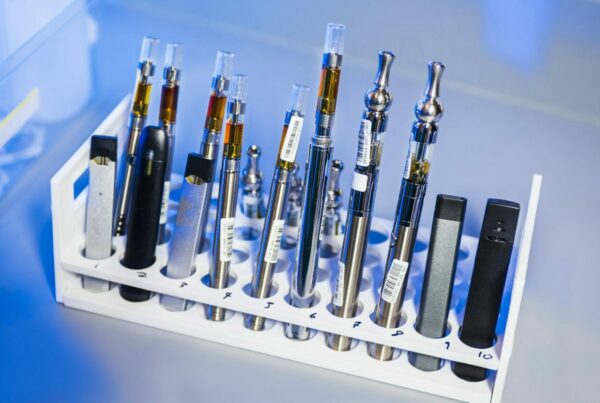N, N-Dimethyltryptamine (DMT) is a compound commonly found in both flora and fauna and is known for its potent yet short-lived psychedelic effects upon ingestion.
New research increasingly suggests that DMT, which naturally exists within the body, plays critical roles in our peripheral and central nervous systems, potentially serving as a neurotransmitter.
DMT can provoke strong psychedelic reactions, but it generally doesn’t cause many negative side effects, with the notable exception of potential cardiovascular complications when large doses are administered through injection.
Let’s explore DMT and its various functions, ranging from recreational use to its promising potential in scientific exploration and therapeutic uses.

DMT: A Brief Overview
| Aspect | Description |
| Name | N, N-Dimethyltryptamine (DMT) |
| Type | Indole alkaloid |
| Occurrence | Naturally found in various plants and animals |
| Psychoactive Effects | Produces brief, intense psychedelic experiences upon ingestion. |
| Method of Consumption | Can be smoked, injected, or ingested orally. |
| Duration of Effects | Effects are short-lived, typically lasting from 5 to 30 minutes. |
| Chemical Structure | Comprises a tryptamine core with two methyl groups connected to the amine nitrogen atom. |
| Metabolism | Rapidly metabolized by the body, degraded by monoamine oxidase (MAO). |
| Cultural Use | Historically used in various ceremonial and shamanic rituals by indigenous cultures. |
| Alternative Names | Dimitrifantasiabusinessman’s tripBusinessman’s special45-minute psychosisspiritual molecule |
DMT’s Role in Mental Health
N, N-Dimethyltryptamine (DMT) is garnering attention for its potential benefits in mental health, despite its reputation for producing intense psychedelic experiences. Recent research suggests a connection between DMT and improved mental well-being.
Effects on Psychological and Emotional Well-being
DMT’s psychedelic effects are renowned for eliciting deep emotional reactions and altering states of consciousness. These characteristics could potentially pave the way for innovative therapeutic methods to address mental health challenges, assist in emotional processing, and offer new perspectives on personal traumas.
Neuroplasticity and Brain Function
Research suggests that DMT could influence neuroplasticity, thereby enhancing the brain’s ability to adapt and reorganize. Investigating its impact on synaptic plasticity and neural connectivity might yield potential treatments for disorders related to neural maladaptation.
Potential Therapeutic Use for Mental Health Disorders
Initial studies underscore DMT’s potential in treating conditions such as depression, addiction, and PTSD. Its ability to instigate mystical or spiritual experiences may offer a unique method of psychotherapy and help in reframing negative thought processes.
Researching the natural production of DMT within the body underscores its significance in mental health resilience, stress management, and overall psychological well-being. Understanding how the body controls internal DMT concentrations could set the stage for innovative therapeutic strategies.
DMT and Mental Health Disorders
| Mental Health Disorder | Description | Effectiveness of DMT | Benefits |
| Depression | Defined as a mood disorder characterized by persistent sadness, lack of interest, and low motivation | Initial research suggests that DMT could alleviate symptoms by inducing deeply emotional experiences. | Its rapid onset and ability to provoke transformative experiences may propose novel and unique therapeutic approaches for reframing negative thought patterns and enhancing emotional processing |
| Post-Traumatic Stress Disorder (PTSD) | A mental health condition triggered by traumatic events leading to flashbacks, intense anxiety, and intrusive thoughts | Early studies suggest DMT’s potential to regulate symptoms by inducing spiritual or mystical experiences that could help patients reframe traumatic memories | DMT’s potential to induce altered states of consciousness may be beneficial in promoting emotional processing and offering a fresh perspective on traumatic experiences |
| Addiction | A complex disorder characterized by compulsive engagement in rewarding stimuli despite adverse consequences | Emerging research suggests DMT’s potential role in interrupting addiction cycles and reducing substance cravings | The capability of DMT to provoke powerful and transformative experiences might assist individuals in altering their behavioural patterns and confronting their issues with addiction |
Approaches to Utilizing DMT
DMT, renowned for provoking short but intense psychedelic episodes, can be administered in various ways. The chosen method often influences the intensity and duration of the experience.
Smoking:
When smoked in a pipe or vaporized, DMT requires meticulous temperature control to avoid overheating and combustion. Smoking DMT results in an almost instantaneous psychedelic journey, usually lasting from 5 to 15 minutes.
Oral Intake:
Taking DMT orally triggers slower effects that last considerably longer, often for several hours. This extended duration is due to the slower metabolization of DMT when mixed with an MAOI.
Injection:
DMT can be injected directly into the bloodstream for rapid and potent effects.
This method results in an immediate and powerful experience but necessitates precise dosage and carries greater risks.
Insufflation (Snorting):
Snorting DMT results in a more gradual onset of effects than smoking, but potentially yields a more enduring experience.
Sublingual or Buccal Administration:
When administered through the oral mucosa, this method represents an alternative to smoking and offers a longer, though less intense, experience.
Determining Therapeutic Dosage: N, N-Dimethyltryptamine (DMT)
For smoking, the advised dosage ranges from 20 to 40 mg, while for intravenous use, the suggested dosage ranges from 0.2 to 0.4 mg per kg of body weight. These dosage guidelines are primarily relevant for clinical research, particularly for intravenous use.
- Higher doses administered intravenously are associated with intense visuals, temporary loss of control, and a combined state of anxiety and euphoria
- Interestingly, lower doses have exhibited less desirable effects
- Recreational doses of smoked DMT typically range from 40 to 50 mg, sometimes even reaching up to 100 mg
- Varying doses of intravenous Users of DMT, particularly in doses of 7, 14, 18, and 20 mg, have reported near-death experiences that have resulted in lasting and positive enhancements in psychological health.
Availability of DMT
Osmosis – 4-ACO-DMT Ethereal Essence Tincture
This tincture claims to contain 4-Acetoxy-N, N-dimethyltryptamine (4-AcO-DMT), a version of DMT. Tinctures are orally consumed liquid extracts, and this specific item may offer a different experience than traditional DMT.
Lucid Supply Co. – 5-MeO DMT Vaporizer
This product is a vaporizer that delivers 5-Methoxy-N, N-dimethyltryptamine (5-MeO-DMT). The active ingredient, 5-MeO-DMT, is known for producing powerful, transformative, and often brief experiences.
Integral Alchemist – Acacia – 1ml DMT Vape Cartridge
Integral Alchemist offers a DMT vape cartridge pre-filled with N, N-Dimethyltryptamine. This product is likely aimed at users who prefer a discreet and convenient way to consume DMT.
Deadhead Chemist – 5-MeO-DMT Cartridge
This cartridge contains 5-Methoxy-N, N-dimethyltryptamine (5-MeO-DMT), a substance known for its deep and potent effects.
There may be potential mental health benefits tied to personal growth, spiritual experiences, or therapeutic applications aimed at improving emotional well-being.
Deadhead Chemist – N, N DMT Cartridge
Another offering from Deadhead Chemist, this cartridge is filled with the classic N, N-Dimethyltryptamine. Cartridges provide a convenient method of DMT consumption, resulting in a more consistent and controlled experience.
Concluding Remarks
The employment of N, N-Dimethyltryptamine (DMT) in
How can one source DMT products responsibly?
Reliable outlets such as Magic Mushrooms Calgary Canada Online Dispensary can provide a wide variety of options and guidance for those interested in responsibly exploring DMT products.
Mental health therapy is a fascinating yet complex journey. The ability of certain compounds to induce intense, albeit transient, psychedelic experiences, opens up new therapeutic possibilities.
Early studies point to its potential role in emotional processing, personal development, and possibly
The substantial influence of mental health therapy necessitates careful thought and responsible usage.
Frequently Asked Questions:
How do different DMT products influence mental health?
For instance, vaporizers may produce immediate effects, while tinctures or vape cartridges could offer more controllable and consistent doses.
Introducing derivative compounds or 5-MeO-DMT can result in varying intensities and differing types of mental health effects.
These nuanced differences underscore the importance of selecting a DMT product based on personal needs and mental health goals.
Can DMT result in enduring changes in mental health and personal development?
There’s anecdotal evidence indicating that DMT-induced experiences could have lasting effects on mental health and personal development.
Highly influential or transformative experiences, such as those resembling near-death experiences, are often associated with ongoing positive changes in psychological health and personal development.
Despite their intense and brief nature, these experiences frequently lead to self-examination, spiritual revelations, and a sense of unity or enlightenment.
People often express a refreshed perspective on life, enhanced emotional resilience, and a heightened appreciation for life following these experiences.
What’s the optimal strategy for using DMT for mental health reasons?
It’s essential to make informed choices, which involve thorough research and understanding of the compound’s effects.
Advice from mental health professionals or seasoned users can provide valuable information about potential risks and rewards.
It’s also vital to comprehend personal tolerance and mental preparedness, and to ensure a supportive and secure environment for the experience.
How does DMT stack up against other psychedelic therapies such as psilocybin or LSD in the realm of mental health treatment?
DMT’s effects, duration, and intensity vary significantly from other psychedelics like psilocybin or LSD. Given its brief lifespan,
it’s clear that highly intense, short-acting psychedelics like DMT demand unique therapeutic strategies in mental health, separate from those applicable to longer-lasting psychedelics.
Recommended Additional Reading:





